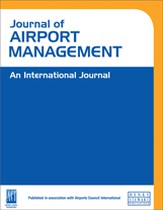Training the airport manager in a post-COVID-19 world
Abstract
Understandably, the overall approach of airports to the post-COVID-19 pandemic has been focused on cultural adaptation with a view to securing economic sustenance. It follows therefore that economic sustenance would depend on whether the passenger would choose to go through a particular airport if he or she has other choices, particularly in transit. The operative word in this context would be ‘confidence’ that the airport would generate in the passenger. The qualities of service that airports have offered thus far are efficiency in delivering services and convenience. These essential qualities would have to mesh with a new relationship with the passenger whereby the airport offers assurance of awareness of the passenger’s health concerns. This paper discusses the possibilities available to airports in the digital age, with which airports can assure the passenger of information sharing in the overall consideration of health and privacy as well as act through a global system that encapsulates precautionary measures that airports could take based on their connectivity to the outside world. The paper also posits that at the centre of this shift of focus is the need to subvert the dominant paradigm of efficiency per se to a combination of efficiency and professional empathy. This is where the manager would come in, and in turn his role would be dependent on the management training he undergoes. In that sense, this paper serves both the manager and the trainer, where the manager would take away the essential elements of predictive intelligence, prioritising and strategising the needs of the passenger that would impact the entire journey of the passenger and not merely his airport experience. The trainer would benefit from the ethical, moral and legal concepts discussed herein that could be incorporated into the training package through the spectrum of digital technology.
The full article is available to subscribers to the journal.
Author's Biography
Ruwantissa Abeyratne PhD, has worked in the field of aviation law and management for 34 years. He is currently President/CEO of Global Aviation Consultancies Inc., and Senior Associate, Air Law and Policy, at Aviation Strategies International, both of which are consultancies headquartered in Montreal. At retirement from the International Civil Aviation Organization (ICAO) after 23 years of service at various senior positions in air transport and air law, Ruwantissa was Coordinator, Air transport Programmes, as well as Senior Legal Officer, heading the Treaty Office of ICAO. He also advised States on their registration and depository obligations with regard to international treaties and their adherence thereto and was General Counsel for ICAO staff members. Prior to his service at ICAO, for 8 years Ruwantissa served the Airlanka airline as Chief Coordinator and Head of International Relations and Insurance. Ruwantissa holds a doctor of civil laws (DCL) from McGill University, doctor of philosophy (PhD) from the University of Colombo, master of laws (LLM) from Monash University, Victoria, Australia, and bachelor of laws (LLB) from the University of Colombo. Ruwantissa is the author of 33 books and over 445 papers in academic and professional journals and edited volumes. His professional reputation rests largely on work in aerospace law, diplomacy and economics. Ruwantissa’s current academic research is focused on air transport economics and aviation and climate change. He holds an impressive record of teaching at graduate level for 22 years in the field of international law and relations and public policy. He is currently visiting professor at McGill University, teaching aviation law and policy at the graduate level. He is a fellow of both the Royal Aeronautical Society and the Chartered Institute of Logistics and Transport.
